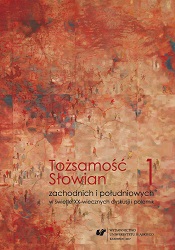Jak pozostać sobą w obcym języku? Strategie konwersji językowej pisarzy pochodzenia słowiańskiego
How to remain oneself in a foreign language? The strategies of linguistic conversion of the writers of Slavic origin
Author(s): Joanna Czaplińska
Subject(s): Language and Literature Studies, Studies of Literature, Theory of Literature
Published by: Wydawnictwo Uniwersytetu Śląskiego
Keywords: literature in exile; language conversion of exiled writers; Piotr Rawicz; Libuše Moníková; Zdenka Becker
Summary/Abstract: The article is devoted to writers who after emigrating decided to change the language in which they wrote their books from their native language to the language of the country which became their second home. The strategies which are described in the article aredetermined by the personal experiences of the writers, for whom the choice of a second language in which their works were to be written became an opportunity to express various attitudes. Piotr Rawicz, a Jew of Polish origin, treated his literary début – the novel Le sang du ciel, written in French – as an autobiography, which was expressed not in a direct manner but in a manner based on intermediation of both the complex narrative devices as well as of language. This enabled him to distance himself from his own experiences. For Libuše Moníková, a writer of Czech origin who writes in German, the thematisation of Czech history and its myths in all the publications which were written in German and published in Germany became a path which enabled a German writer to become a Czech woman. A similar strategy was embraced by Zdenka Becker, a writer of Slovak origin who writes in German, and who in her work engages the painful questions of the Czechoslovakian relations during the period of the deportations of Germans after the Second World War.
- Page Range: 139-153
- Page Count: 15
- Publication Year: 2017
- Language: Polish
- Content File-PDF

